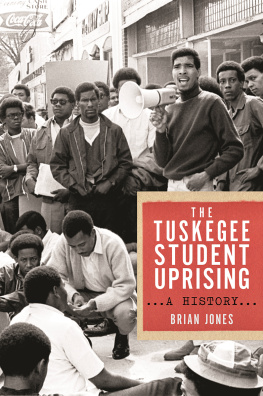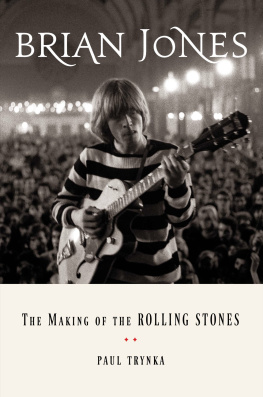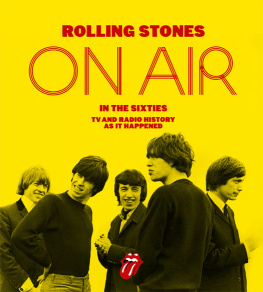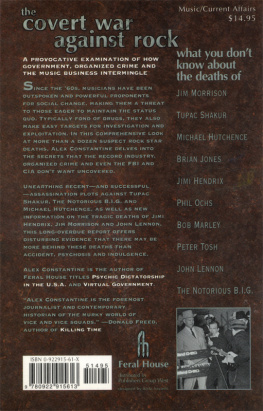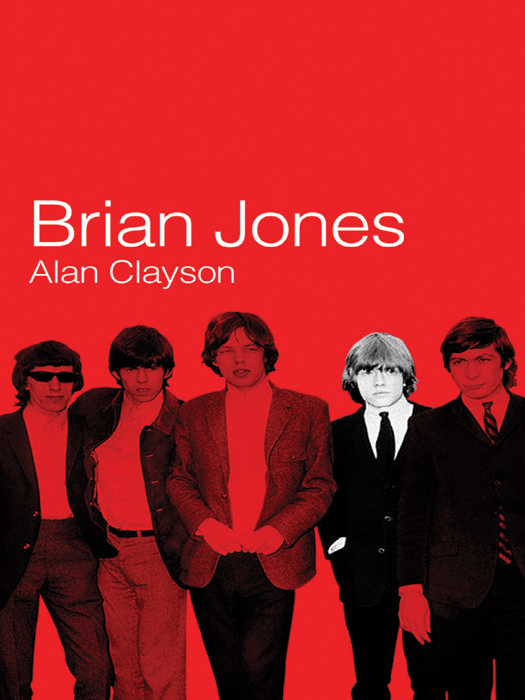Copyright 2003 Alan Clayson
This edition 2010 Alan Clayson
ISBN: 978-0-85712-450-0
Cover Image Corbis
The Author hereby asserts his / her right to be identified as the author of this work in accordance with Sections 77 to 78 of the Copyright, Designs and Patents Act 1988.
All rights reserved. No part of this book may be reproduced in any form or by any electronic or mechanical means, including information storage and retrieval systems, without permission in writing from the publisher, except by a reviewer who may quote brief passages.
Every effort has been made to trace the copyright holders of the photographs in this book, but one or two were unreachable. We would be grateful if the photographers concerned would contact us.
A catalogue record of this book is available from the British Library.
Visit Omnibus Press on the web: www.omnibuspress.com
(A Division of Music Sales Limited, 14-15 Berners Street, London W1T 3LJ)
For all your musical needs including instruments, sheet music and accessories, visit www.musicroom.com
For on-demand sheet music straight to your home printer, visit www.sheetmusicdirect.com
To all at Dawns View
BRIAN, YOURE SO ESOTERIC!!!
placard hoisted by a member of the audience when The Rolling Stones appeared at the Cobo Hall, Detroit, Michigan on 26 November 1965
Contents
About The Author
Born in Dover, England, in 1951, Alan Clayson lives near Henley-on-Thames with his wife, Inese, and sons, Jack and Harry. His portrayal in the Western Morning News as the AJP Taylor of the pop world is supported by Qs his knowledge of the period is unparalleled and hes always unerringly accurate. He has written many books on music, including bestsellers Backbeat (subject of a major film) and The Yardbirds, as well as for journals as diverse as The Guardian, Record Collector, Mojo, The Times, Mediaeval World, Eastern Eye, Folk Roots, Guitar, Hello!, The Independent, Ugly Things and, as a teenager, the notorious Schoolkids Oz. He has also performed and lectured on both sides of the Atlantic, as well as broadcasted on national TV and radio.
From 1975 to 1985 he led the legendary group Clayson And The Argonauts and was thrust to a premier position on rocks Lunatic Fringe (Melody Maker). As shown by the formation of a US fan club dating from a 1992 soire in Chicago Alan Claysons following has continued to grow, as has demand for his talents as a record producer and the number of cover versions of his compositions by such diverse acts as Dave Berry in whose Cruisers he played keyboards in the mid-1980s and New Age outfit Stairway. He has also worked with The Portsmouth Sinfonia, Wreckless Eric, Twinkle, The Yardbirds, The Pretty Things and the late Screaming Lord Sutch, among others. While his stage act defies succinct description, he is spearheading an English form of chanson. Moreover, his latest album, Soire, may stand as his artistic apotheosis, were it not for the promise of surprises yet to come.
Further information is obtainable from www.alanclayson.com
Prologue
Foundation Stone
Well, he was different over the years as he disintegrated. He ended up the kind of guy that you dread hed come on the phone because you knew it was trouble. He was really in a lot of pain but in the early days, he was all right.
John Lennon
While he wasnt someone youd trust with either your heart or your cheque book, Brian Jones was the foundation stone of the group that, to the same arguable degree as The Beatles, soundtracked the Swinging Sixties. Moreover, if Mick Jagger was the mind, Keith Richards the heart and Bill Wyman and Charlie Watts the flesh and blood, the charismatic Jones androgyny with underlying dread was surely the soul of The Rolling Stones. He was also their James Dean, their Jet Harris, their Pete Best, their Ace Kefford, their Syd Barrett, their Sid Vicious.
He satisfies any requirement of a doomed rock hero: a loveless upbringing, bohemian wanderings, drug busts, neurotic self-absorption, aspirations to bridge a gap between lowbrow pop and higher artistic expression, a visual image that remains modern and, to round it off, the beautiful sadness of an early grave. Furthermore, Jones held for a long while some sort of British record as the pop star with the most number of known illegitimate offspring. Yet, despite the unquiet nature of his 27 years, Brian clung onto his good looks just retaining a boys face, albeit one with a lot of miles in the eyes.
His was, therefore, a triumphant and tragic life in which he both glided high on pops strongest winds and swam shoreless seas of despair. He has since moved into an orbit separate from that of the Stones. This has so strong a definition that a forthcoming biopic, The Wicked World Of Brian Jones, threatens to be the British movie of 2005, and an annual memorial event in Brians home town of Cheltenham draws multitudes of pilgrims.
After drifting from pillar to post, from group to unsatisfactory group since his schooldays, the talented and musically adventurous Brians musical career left the runway in 1962 when he formed The Rolling Stones, who, to his apparent chagrin, began moving away from their blues core during an accelerating run of hit singles written by Jagger and Richards. Though their abilities brought the group continued success, and may have saved Jones from a more mundane existence, his thwarted ambition as a composer deserves sympathy.
As he lost his grip on both the Stones and non-professional realities, Brian wanted to, but couldnt, rewind to 1962, when everything was possible. He wanted to, but couldnt, brush aside all the millennia that had passed since, like so many matchsticks. Once the groups livest wire, Jones was reduced to a pitiful isolate, shrouded in melancholy and paranoia, the twinkle vanished from his eye. His exit weeks before his death in 1969 did not, therefore, bring the Stones to their knees, as it might have done had he left six years earlier.
The posthumous legend continues to be nourished by half-truths, tidy-minded media fiction and no less than six previous books about Jones, though none could be described as definitive.
In this account, care has been taken to address the myriad social, cultural, economic, environmental and further factors that polarise and prejudice what is generally understood about Brian Jones already, and the new and rediscovered evidence and information that recent research has brought to light. Often pop biography and thats all this is has tended to shy away from these areas even though they form a more tangible basis for investigation than treating flippant public remarks by the subject as gospel.
Those who devote themselves to collating facts about The Rolling Stones may pounce on mistakes and omissions while scrutinising this work. All I can say to them is that its as accurate as it can be after the synthesis of personal memories and interviews with some of the key dramatis personae not to mention filing cabinet drawers labelled Brian Jones, and exercise books full of doctors prescription-like scribble drawn from press archives some of them quite obscure.
Please put your hands together for Iain MacGregor, Laura Brudenell, Chris Harvey, Nikky Twyman, Claire Musters and the rest of the team at Sanctuary, who went far beyond the call of duty from this biographys sluggish genesis to its final publication.


